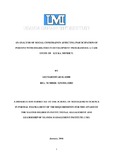| dc.contributor.author | BYABAGAMBI, Leonard | |
| dc.contributor.author | Kyohairwe, Stella (Supervisor) | |
| dc.contributor.author | Komakech, Innocent (Supervisor) | |
| dc.date.accessioned | 2017-07-28T12:08:25Z | |
| dc.date.available | 2017-07-28T12:08:25Z | |
| dc.date.issued | 2016-01 | |
| dc.identifier.citation | APA | en_US |
| dc.identifier.other | 12/MIML/2/002 | |
| dc.identifier.uri | http://hdl.handle.net/20.500.12305/245 | |
| dc.description | A Dissertation Submitted to the School of Management Science in Partial Fulfillment of the Requirements for the Award of the Master Degree in Institutional Management and Leadership of Uganda Management Institute (UMI) | en_US |
| dc.description.abstract | The study analyzed the social constraints to participation by Persons with Disabilities (PWDs) in development programmes in their communities with specific focus to Bukooma sub-county Luuka district. It was guided by three research objectives which were; examine the influence of cultural beliefs, attitudes and perception of disability on the participation of PWDs in development programmes in Bukooma Sub-county. The study used a cross sectional survey design including quantitative and qualitative approaches. The study population involved; PWDs, sub-county councilors for PWDs, community members, service providers, Ministry officials at Principal Level, sub-county technical teams and Non-disabled councilors. Data was collected using questionnaires and interviews. In data analysis frequencies, percentages, means were obtained, correlations and regressions were used to show the magnitude of effect the independent variables have on the dependent variable. Study findings revealed that cultural beliefs are positively associated with participation of Persons with Disabilities in the development programmes (r=.389, p=.000) with coefficient of determination R2=0.152, which shows that 15.2% variation in participation of PWDs in the development programmes is explained by changes in cultural beliefs. Hence improvement in cultural beliefs would lead to 15.2% chance change in the participation of Persons with Disabilities in the development programmes. Findings also revealed a significant relationship between attitudes and participation of Persons with Disabilities in the development programmes (r=.677, p=.000) with a coefficient of determination R2 of .459 that indicates 45.9% chance change in participation of PWDs in the development programmes being explained by changes in attitudes. Also it was found out that there is a positive significant relationship between perception on disability and participation of PWDs in the development programmes in Bukooma Sub-county, Luuka District (r=.513 p=.000) with a regression coefficient determination of R2 =263, meaning that there is 26.8% chance change in participation of PWDs in the development programmes if attitudes are improved. It was therefore concluded that a wide number of negative beliefs are held against persons with disability, community members have negative attitude towards the effectiveness of PWDs in addressing community development tasks and the different negative perceptions held against person with disability affect effective participation of PWDs in community development projects. It is therefore recommended that there is need to sensitize community members against existing prejudice that PWDs are a curse and prioritize involvement of PWDs in development programmes at different stages of development programmes | en_US |
| dc.language.iso | en | en_US |
| dc.publisher | Uganda Management Institute | en_US |
| dc.subject | Analysis of Social Constraints | en_US |
| dc.subject | Disabilities in Development | en_US |
| dc.subject | of Luuka District | en_US |
| dc.title | An Analysis of Social Constraints Affecting Participation of Persons with Disabilities in Development Programmes: A case Study of Luuka District. | en_US |
| dc.type | Book | en_US |

